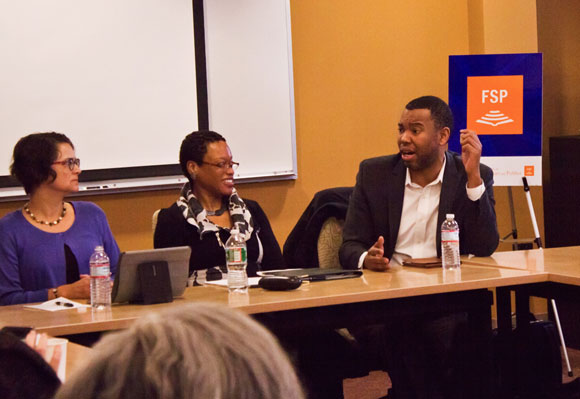
Scholars Martha Jones, Melissa Nobles and Ta-Nehisi Coates discussed discrimination and reparations Tuesday. Photo by Jonathan Lee.
How can the United States rectify a legacy of slavery, discrimination and racial disenfranchisement? On Tuesday, members of the Duke and Durham community discussed this question and other issues relating to reparations before a packed conference room at the Forum for Scholars and Publics in Old Chemistry Building.
Ta-Nehisi Coates, a senior editor at The Atlantic, moderated the panel discussion. Coates, who wrote the critically acclaimed essay “The Case for Reparations,” said that although actually gaining reparations -- the compensation for the economic and “moral debt” of slavery, segregation and discrimination – is unlikely, there is value in having a national, public discussion.
Beryl Satter, a historian at Rutgers University, spoke of the importance of confronting our history and examining the society we live in. “There’s a power in knowing how power works,” Satter said.
Panelists emphasized the practical issues involved in the argument for reparations, including African-American access to health care and quality housing.
Martha Jones, a historian and legal scholar at the University of Michigan, pointed to examples of activists who combatted discriminatory housing practices in Chicago. “It is possible for people to raise their consciousness about the system they live in … and challenge it,” Jones said.
Melissa Nobles, a political scientist at MIT, said policy often starts only when politicians have a convenient opportunity to discuss the issue. She added a national commission would be a first step for reparations to evolve from political imagination into full-fledged policy.
When asked about the future of race relations in the United States, Coates was cautious about the chances for improvement.
“Political imaginations are not rainbows and candy," Coates said. "[We] have to be serious about what the stakes are,” he said, referring to the consequences of not addressing reparations.
More than 80 students, scholars and Durham community members attended.